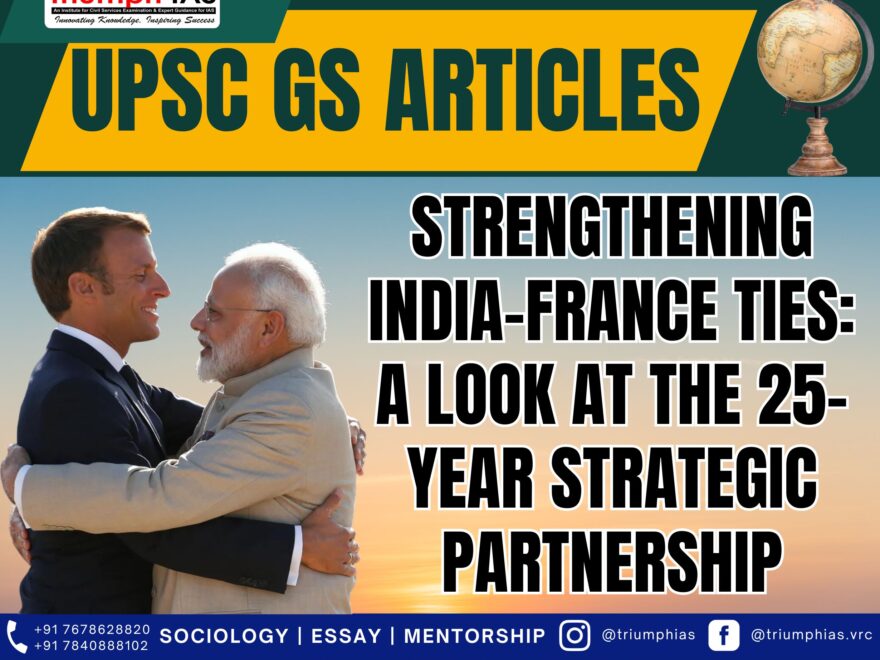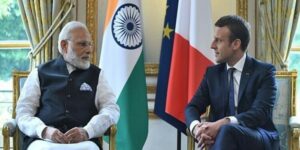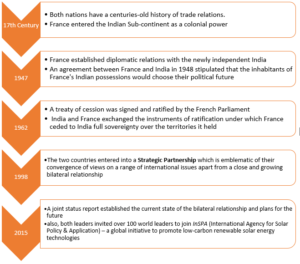A new phase in India-France ties
(Relevant for General Studies Paper | International Relations | Prelims/Mains)
A new phase in India–France ties
Recently, Commemorating the 25th anniversary of the India-France strategic partnership was the central focus of the Prime Minister’s two-day trip to France, which concluded with the signing of several agreements and a series of defense-related contracts.
This visit witnessed both nations unveiling an “Indo-Pacific Roadmap,” encompassing aspects like security, environmental concerns, and renewable energy. Additionally, a comprehensive “Horizon 2047” agenda was introduced, highlighting a more robust military-industrial partnership, collaborative efforts in digital technologies, the shift towards a sustainable, low-carbon economy, urban development, trade and investments, and people-to-people interactions.
While India’s relationships with each of the permanent members of the United Nations Security Council (P5) hold unique characteristics, the distinctive feature of the India-France connection lies in its geopolitics devoid of judgment. It wouldn’t be an overstatement to assert that among all the countries visited by the Prime Minister, particularly in the Western hemisphere, France stands out as the one sharing the most common ground with India.
India’s Diplomatic Ties with France
- Foundations of the Relationship: India and France share deep-rooted cultural, trade, and economic ties. The India-France strategic partnership, established in 1998, has gained substantial momentum over time and has transformed into an even closer, multifaceted relationship spanning various areas of collaboration.
Both nations have adhered to three key principles in their relationship:
-
- Non-interference in each other’s internal matters.
- A strong commitment to strategic autonomy and non-alignment.
The refusal to involve the other in their respective coalitions and alliances. In numerous ways, this relationship has distinguished itself from other major partnerships India has cultivated worldwide.
- France’s Approach to India’s Affairs: Indo-French relations are grounded in mutual respect for each other’s strategic autonomy. France has consistently refrained from commenting on India’s internal affairs or its foreign policy decisions. While France has taken a leading role in the Western response to Russia’s conflict in Ukraine, it has not joined other Western nations in publicly pressuring India to alter its stance. Even when India abstained from voting on resolutions at the United Nations Security Council (UNSC) and the United Nations General Assembly (UNGA), France refrained from expressing disappointment, considering its co-authorship of a UNSC resolution with Mexico (aimed at ensuring unhindered humanitarian access within the conflict zone). Even during India’s nuclear tests in Pokhran (Pokhran-II), French diplomats at the UNSC did not endorse the U.S.-led effort to impose sanctions on India. Furthermore, France supplied uranium to power the Tarapur reactors.
- Defence Collaboration at the Heart: At the core of the Indo-French partnership lies defense collaboration. France has proven to be a more willing and generous partner in comparison to other Western nations. Starting from the Rafale deal to the recent acquisition of 26 units of the aircraft’s naval version, France has been open to providing India with some of its most advanced defense systems. France’s technology transfers have assisted India in building six Scorpene-class submarines, with another three in the process of procurement to bolster the Navy’s dwindling fleet.
- Alignment on NATO+: France has publicly expressed its disapproval of plans for a NATO-plus partnership that would involve the North Atlantic Treaty Organization (NATO) establishing direct ties with Japan, Australia, New Zealand, South Korea, and even India. India has also rejected this proposal, asserting that NATO is not a model that applies to India.
- Strategic Collaborations: France has been accommodating regarding the “Quad-Plus” coalitions, initially proposed in 2020 (although these were dropped following the U.S.-France disagreement over the AUKUS agreement). France is the only country with which the Indian Navy has conducted joint patrols so far. Future plans may involve the use of French overseas territories in Reunion, New Caledonia, and French Polynesia, as well as India’s Andaman Islands, for port visits and joint reconnaissance activities between both navies on a bilateral basis. The recent India-France Roadmap on the Indo-Pacific also emphasizes that neither side seeks to draw the other into their respective regional military coalitions.
Challenges in relationship
Diplomatic relations between France and India, although generally favorable, are hampered by the absence of a Free Trade Agreement (FTA), which constrains the full utilization of trade potential. The sluggish progress, and in some cases, a lack of progress, on the India-EU Broad-Based Trade and Investment Agreement (BTIA) exacerbates this challenge. Despite a robust defense partnership, the collaboration on defense and security matters may face occasional influence from differing priorities and approaches. India’s regional focus and adherence to a “non-aligned” policy could potentially clash with France’s global interests. France has also expressed concerns regarding India’s insufficient protection of intellectual property rights, which has an impact on French businesses operating within India.
How can this relationship can be more strengthened
- Leveraging Mutual Aspirations to Empower Each Other: Both nations’ shared commitment to upholding strategic autonomy within a complex geopolitical landscape has fostered a level of trust and a practical partnership. France possesses strengths in diplomatic, military, space, and nuclear domains, making it a valuable partner for India. India holds significant importance for France, particularly in trade and defense cooperation, especially in the face of challenges like Russian aggression or terrorism in Africa. Both countries can lend support to each other in shaping the global order and even in balancing relationships with other nations upon which one of them heavily relies.
- Enhanced Collaboration in the Indo-Pacific: The Indo-Pacific concept has offered a valuable framework for fostering robust Franco-Indian relations. France, in contrast to its Quad partners, maintains a direct stake in Indian Ocean stability due to its overseas territories and military installations in the region. The Indo-Pacific dialogue between the two nations should facilitate the safeguarding of strategic interests and bolster bilateral cooperation.
- Prospective Areas of Partnership with France: France assumes a pivotal role in India’s ambitious initiatives to expand domestic arms production, involving increased private and foreign investment. Conversations should encompass emerging avenues for collaboration, encompassing connectivity, climate change, cyber-security, and advancements in science and technology.
France and India, significant players, one within Europe and the other within Asia, share a comparable worldview. In essence, both nations pursue an autonomous foreign policy and exercise strategic independence, envisioning their ability to influence a multipolar world. Of greater significance, both these influential entities recognize that collaborating closely significantly enhances the likelihood of realizing this vision.
Reference The Hindu
Related Blogs…
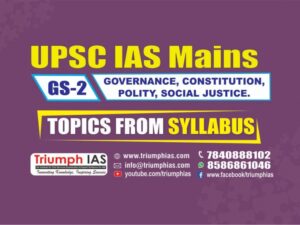 |
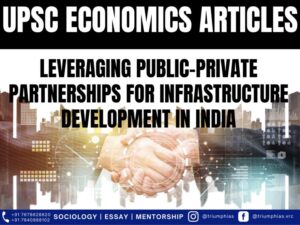 |
Frequently Asked Questions:
- Question: Explain the concept of social stratification and its impact on contemporary societies.
Answer: Social stratification refers to the hierarchical arrangement of individuals or groups based on attributes like wealth, power, and social status. It affects access to resources and opportunities in modern societies, perpetuating inequality.
2. Question: Discuss the role of culture in shaping human behavior and social norms.
Answer: Culture plays a crucial role in influencing behavior and shaping social norms. It encompasses shared beliefs, values, and practices that guide individuals within a society.
3. Question: Analyze the challenges and prospects of gender equality in today’s world.
Answer: Achieving gender equality is an ongoing global challenge, with progress made in some areas but barriers still existing. Prospects lie in education, policy reforms, and changing societal attitudes.
4. Question: Define the concept of social change and provide examples of factors contributing to social change.
Answer: Social change refers to significant alterations in society’s structure, institutions, and values over time. Factors include technological advancements, cultural shifts, and economic developments.
5. Question: Explore the impact of globalization on traditional social structures and identities.
Answer: Globalization has led to the interconnectedness of societies, often challenging traditional social structures and identities as people adapt to new cultural influences and economic forces.
GS Related Practices Questions…
To master these intricacies and fare well in the Sociology Optional Syllabus, aspiring sociologists might benefit from guidance by the Best Sociology Optional Teacher and participation in the Best Sociology Optional Coaching. These avenues provide comprehensive assistance, ensuring a solid understanding of sociology’s diverse methodologies and techniques.
India-France ties, strategic partnership, defense collaboration, Indo-Pacific, diplomatic relations, UPSC Sociology Optional Paper, sample questions, short answers.

Why Vikash Ranjan’s Classes for Sociology?
Proper guidance and assistance are required to learn the skill of interlinking current happenings with the conventional topics. VIKASH RANJAN SIR at TRIUMPH IAS guides students according to the Recent Trends of UPSC, making him the Best Sociology Teacher for Sociology Optional UPSC.
At Triumph IAS, the Best Sociology Optional Coaching platform, we not only provide the best study material and applied classes for Sociology for IAS but also conduct regular assignments and class tests to assess candidates’ writing skills and understanding of the subject.
Choose The Best Sociology Optional Teacher for IAS Preparation?
At the beginning of the journey for Civil Services Examination preparation, many students face a pivotal decision – selecting their optional subject. Questions such as “which optional subject is the best?” and “which optional subject is the most scoring?” frequently come to mind. Choosing the right optional subject, like choosing the best sociology optional teacher, is a subjective yet vital step that requires a thoughtful decision based on facts. A misstep in this crucial decision can indeed prove disastrous.
Ever since the exam pattern was revamped in 2013, the UPSC has eliminated the need for a second optional subject. Now, candidates have to choose only one optional subject for the UPSC Mains, which has two papers of 250 marks each. One of the compelling choices for many has been the sociology optional. However, it’s strongly advised to decide on your optional subject for mains well ahead of time to get sufficient time to complete the syllabus. After all, most students score similarly in General Studies Papers; it’s the score in the optional subject & essay that contributes significantly to the final selection.
“A sound strategy does not rely solely on the popular
Opinion of toppers or famous YouTubers cum teachers.”
It requires understanding one’s ability, interest, and the relevance of the subject, not just for the exam but also for life in general. Hence, when selecting the best sociology teacher, one must consider the usefulness of sociology optional coaching in General Studies, Essay, and Personality Test.
The choice of the optional subject should be based on objective criteria, such as the nature, scope, and size of the syllabus, uniformity and stability in the question pattern, relevance of the syllabic content in daily life in society, and the availability of study material and guidance. For example, choosing the best sociology optional coaching can ensure access to top-quality study materials and experienced teachers. Always remember, the approach of the UPSC optional subject differs from your academic studies of subjects. Therefore, before settling for sociology optional, you need to analyze the syllabus, previous years’ pattern, subject requirements (be it ideal, visionary, numerical, conceptual theoretical), and your comfort level with the subject.
This decision marks a critical point in your UPSC – CSE journey, potentially determining your success in a career in IAS/Civil Services. Therefore, it’s crucial to choose wisely, whether it’s the optional subject or the best sociology optional teacher. Always base your decision on accurate facts, and never let your emotional biases guide your choices. After all, the search for the best sociology optional coaching is about finding the perfect fit for your unique academic needs and aspirations.
To master these intricacies and fare well in the Sociology Optional Syllabus, aspiring sociologists might benefit from guidance by the Best Sociology Optional Teacher and participation in the Best Sociology Optional Coaching. These avenues provide comprehensive assistance, ensuring a solid understanding of sociology’s diverse methodologies and techniques. Sociology, Social theory, Best Sociology Optional Teacher, Best Sociology Optional Coaching, Sociology Optional Syllabus.
Best Sociology Optional Teacher, Sociology Syllabus, Sociology Optional, Sociology Optional Coaching, Best Sociology Optional Coaching, Best Sociology Teacher, Sociology Course, Sociology Teacher, Sociology Foundation, Sociology Foundation Course, Sociology Optional UPSC, Sociology for IAS,
Follow us :
🔎 https://www.instagram.com/triumphias
🔎https://www.youtube.com/c/TriumphIAS
https://t.me/VikashRanjanSociology
Find More Blogs
|
Scope of the subject and comparison with other social sciences |
|||
|
|
|
|
Modernity and social changes in Europe |

